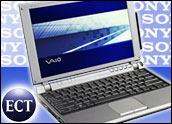
With help from wireless carrier Cingular, Sony has widened both the reach and variety of wireless technology in its latest, ultra-lightweight Vaio T-Series notebook PC, which allows users to connect laptops to the Internet almost anywhere there is cellular wireless coverage through Cingular’s EDGE Network.
The new Vaio T-Series, aimed at enterprise users, is being hailed as the first widely available notebook with integrated high-speed wireless wide area network (WWAN) capability, which provides connectivity that is not as fast as WiFi 802.11 wireless, but nonetheless is possible where other wireless technologies cannot reach.
Less Than Perfect?
However, despite praise for its sleek design, battery life and variety of wireless options, the T-Series has reportedly spotty cellular coverage and may have limited demand from corporate users, who already have connectivity in many airports and hotels, and who may also turn to PC cards that allow WWAN connectivity with a subscription.
Analysts also said that while cellular telephones are replaced on the average of every one to two years, laptop life is longer and could tie users to an older technology while wireless network capabilities advance.
“By embedding the wide area technology, you’re wedding the user to a particular interface, while network capabilities are still advancing,” Yankee Group analyst John Jackson told TechNewsWorld. “What this demonstrates is there is sufficient confidence in the market for embedded WWAN, as Sony sees it. It’s not a tremendous hit to the bill of materials and it does add functionality increases.”
Made for Mobile Pros
Sony said the new Vaio sports not only WWAN connectivity — available with Cingular’s EDGE network in 13,000 U.S. cities and towns and highways in between — but uses its own SmartWi technology to “quickly and easily toggle between various connectivity options” using the PC’s function keys.
The notebook, aimed at mobile business users, features wireless LAN (WLAN) for WiFi, Bluetooth for peripherals, and the WWAN access for the park, road, or elsewhere where there may be no WiFi available.
“The exciting combination of our hardware and Cingular’s service allows you to go beyond the limited world of corporate, private and public hotspots to get online wherever you happen to be,” said a statement from Vaio product marketing general manager Mike Abary. “Cingular and Sony will be the first to reach a broad market with a powerful, integrated WWAN PC solution that is a true demonstration of both companies’ commitment to innovation in serving the mobile professional.”
The notebook — thin and light (three pounds) with a DVD burner, 10.6-inch LCD screen and extended-use battery — sells for about US$2,200, and the WWAN service is priced at $50 or $70 per month, depending on usage.
Life-Limited
Gartner research vice president Phil Redman told TechNewsWorld although the Vaio T-Series may be the first PC of its kind aimed at the horizontal, enterprise market, other products, including notebooks from Panasonic and Fujitsu, have already featured WWAN connectivity.
Redman said despite the increased reach and capabilities of newer wireless technologies, there is not much demand for the connectivity, which can also be achieved through popular PCMCIA cards that can be used with a wide variety of notebook PCs.
Vaio T-Series users could gain the added wireless coverage and battery life through the specifically built machine, said Redman, but he doubted the device would reach beyond a niche, echoing the idea that notebooks must last for the five-year time frame and might become outdated if tied to today’s wireless networking technology.
Cherry Picking
DataComm president Ira Brodsky told TechNewsWorld the Vaio T-Series was the first product of its kind targeted at the enterprise user and indicated that though there may be larger opportunity in the consumer market, Sony and Cingular are aiming the notebook at the enterprise simply because it is easier.
“In a sense, they’re cherry-picking by going after the enterprise because it’s not a huge market, and those are the users willing to pay $70 to $80 a month,” he said. “With a notebook like this, the usage as a group is not putting tremendous capacity strains on the network. One reason operators are focusing on notebooks is because it’s a way for them to limit demand, which is spread over the network.”
Brodsky said while many mobile enterprise users are satisfied with the WiFi offerings in hotels, airports and public places, the Vaio T-Series might appeal to those who need constant connectivity.
“If they need access wherever they are, then this is more universal in that sense,” he said.





















































